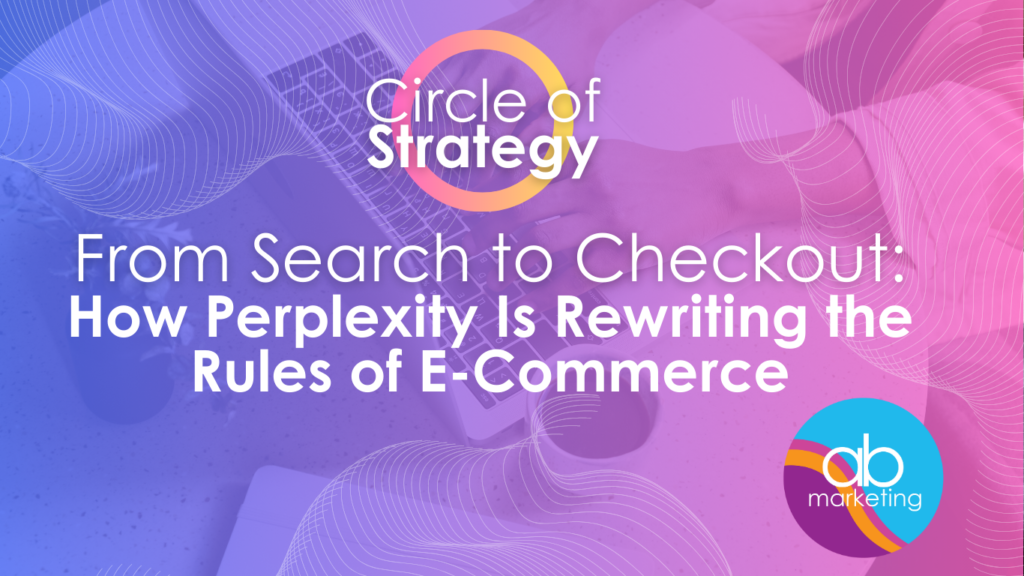From Search to Checkout: How Perplexity Is Rewriting the Rules of E-Commerce

The e-commerce world has always been shaped by how people discover products. From the early days of Yahoo directories to the dominance of Google Search and the rise of Amazon as a product-first search engine, the journey has always started with a question.
Now, a new disruptor is changing that question—and the destination.
Perplexity AI, a fast-growing conversational answer engine, has partnered with PayPal to allow users to purchase products directly within its platform. It’s a significant step that signals a broader trend: AI assistants are no longer just tools for researching—they’re becoming tools for buying.
And that means e-commerce brands need to adapt, fast.
E-Commerce and the Shift in Discovery
E-commerce has historically revolved around three major phases:
- Search and discovery – Where consumers research options, often using Google or Amazon.
- Consideration – Comparing products, reading reviews, watching videos.
- Purchase – Clicking through to a site or marketplace to complete the transaction.
Over the past few years, we’ve already seen some fragmentation. Social media platforms like Instagram and TikTok began shortening the path to purchase with influencer links, in-app shops, and livestream shopping. But with AI, the funnel shortens even further—sometimes collapsing entirely into a single interface.
Perplexity is now at the forefront of this transition.
What Is Perplexity, and How Is It Different?
Perplexity is often referred to as a “conversational answer engine.” It uses large language models (LLMs), including OpenAI’s GPT-4 and other foundational models, to respond to natural-language queries with concise, citation-backed, and web-connected answers.
Here’s how it stands out:
- Real-time data: Unlike some AI tools, Perplexity is directly connected to the internet, ensuring users get the most current information.
- Source transparency: It consistently cites and links to its sources—something that’s particularly valuable for product discovery and credibility.
- Search-like UX: Instead of a chat window buried in a productivity tool, Perplexity functions much like a search engine, making it more intuitive for information and product research.
- Now transactional: With its PayPal partnership, users can go from question to purchase without leaving the platform.
This differentiates it from:
- ChatGPT, which (in its free version) operates without internet browsing and is more generalized in its use cases.
- Google Gemini, which leans on Google’s ecosystem but doesn’t yet offer in-assistant purchasing.
- Anthropic’s Claude, which is known for its long-context reasoning and enterprise appeal, but is not a consumer-facing search tool.
What This Means for E-Commerce Brands
AI assistants like Perplexity are blurring the lines between search engines, product discovery tools, and online storefronts.
For e-commerce brands, this shift introduces both a challenge and an opportunity.
1. AI is becoming the new search engine
Customers may now search “best budget earbuds under $50” in Perplexity instead of Google. If your product isn’t in one of the sources Perplexity pulls from, you’re invisible.
Action: Focus on being cited. Improve your product SEO across high-authority websites and marketplaces. Build partnerships with publishers whose content ranks well on Perplexity.
2. AI is becoming a conversion point
With PayPal now integrated, Perplexity isn’t just helping people decide—it’s helping them buy.
Action: Think beyond content. Ask how your products can be connected to AI transactions. Watch for emerging API integrations, affiliate partnerships, or marketplaces designed specifically for AI-first shopping.
3. Content must be structured and trustworthy
LLMs gravitate toward clear, authoritative content with metadata, schema markup, and strong signals of expertise.
Action: Revisit your product pages, FAQs, blogs, and reviews. Make sure they’re optimized for both humans and machines.
A Real-Time Opportunity
It’s important to note that AI-assisted commerce is still in its early stages. Perplexity’s PayPal integration is currently limited, and not every product is available for purchase this way.
However, the direction is clear: AI platforms are becoming end-to-end shopping experiences.
Just like the early adopters of SEO or influencer marketing reaped the rewards before the masses arrived, brands that start exploring AI optimization now will be in a better position to grow with this trend rather than chase it later.
Final Thoughts
Perplexity’s evolution from an answer engine to a commerce engine is a signal—not just of its own ambition, but of where consumer behavior is headed.
The e-commerce brands that will win in the next five years aren’t just those that rank well on Google or perform on Instagram. They’re the ones that understand this new AI-first landscape and treat platforms like Perplexity as the next generation of search and sales.
Want to Stay Ahead?
At AB Marketing, we help e-commerce businesses optimize for the future—not just today. If you’re ready to prepare your brand for AI-powered discovery and conversion, let’s talk.
